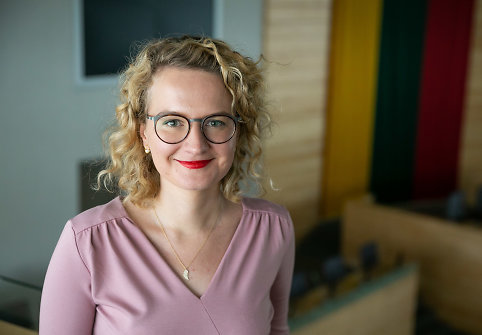
Engaging the diaspora a priority
Just over a year ago, you may or may not have voted in the 2020 Lithuanian parliamentary election. If you were following that election, you know that Aušrinė Armonaitė led the Freedom Party into an election for the first time. She stood for election in the newly created Lithuanians abroad constituency, which granted parliamentary representation to Lithuanians living outside of the country.
Following the confirmation of election results, the Freedom Party received 11 seats and formed a coalition with the Liberal Movement and election winner Homeland Union, with an agreement signed on November 9, 2020. Armonaitė became Minister of the Economy and Innovation, and as parliamentary representative of the diaspora, sees great potential in bringing Lithuanians from abroad into Lithuanian economic life, attracting talent, investment, exports, consultants and enabling greater market activation.
Armonaitė has distinguished three ways to engage the diaspora. First of all, her assistant Karolis Žemaitis was assigned to diaspora questions. She thinks other institutions should also have diaspora consultants or officials familiar with it to help with market research, development, diversification and investment solicitation.
She notes that it is a priority for the government to create a network of commercial attachés throughout the world. Currently they number thirteen, and Lithuania hopes to double that figure over the next three years. Its goal is to work more actively with diaspora representatives in various countries, through agencies such as “Invest Lietuva” and “Enterprise Lithuania”, which already have representatives abroad. The minister hopes that these institutions will work with embassies and consulates abroad as “Team Lithuania”.
Armonaitė notes that her ministry is in the process of implementing various reforms, for example, in the area of innovation, where several consultants from abroad have been engaged to share their insights.
Lithuania’s Economic Diplomacy Council members are not only representatives of trade associations but also world Lithuanian organizations. Other sources are groups such as Global Lithuanian Leaders (GLL, a network of over 2,000 professionals in 22 countries) and the World Lithuanian Community, the World Lithuanian Youth Association, as well as other, newer organizations. The minister also highlights the program “Create Lithuania”, which attracts professionals with international experience to work for the public sector, some of whom end up staying with Lithuanian companies.
Another ministry goal is to reduce taxes for those who return to the Lithuanian labour market, in the hope of attracting and retaining workers who have gone abroad. Discussion is taking place on laws regarding the status of foreigners and changes in work visas with a view to lessening restrictions for independent professionals or those working remotely.
Another project is the International House Vilnius, which allows a one-stop process for acquiring a resident permit, health insurance, tax consultation, school registration and fulfilling other requirements.
It is the minister’s belief that representatives of the Lithuanian diaspora are one of the cornerstones for the success of the country’s economic diplomacy.
From LRT.lt, alkas.lt



























